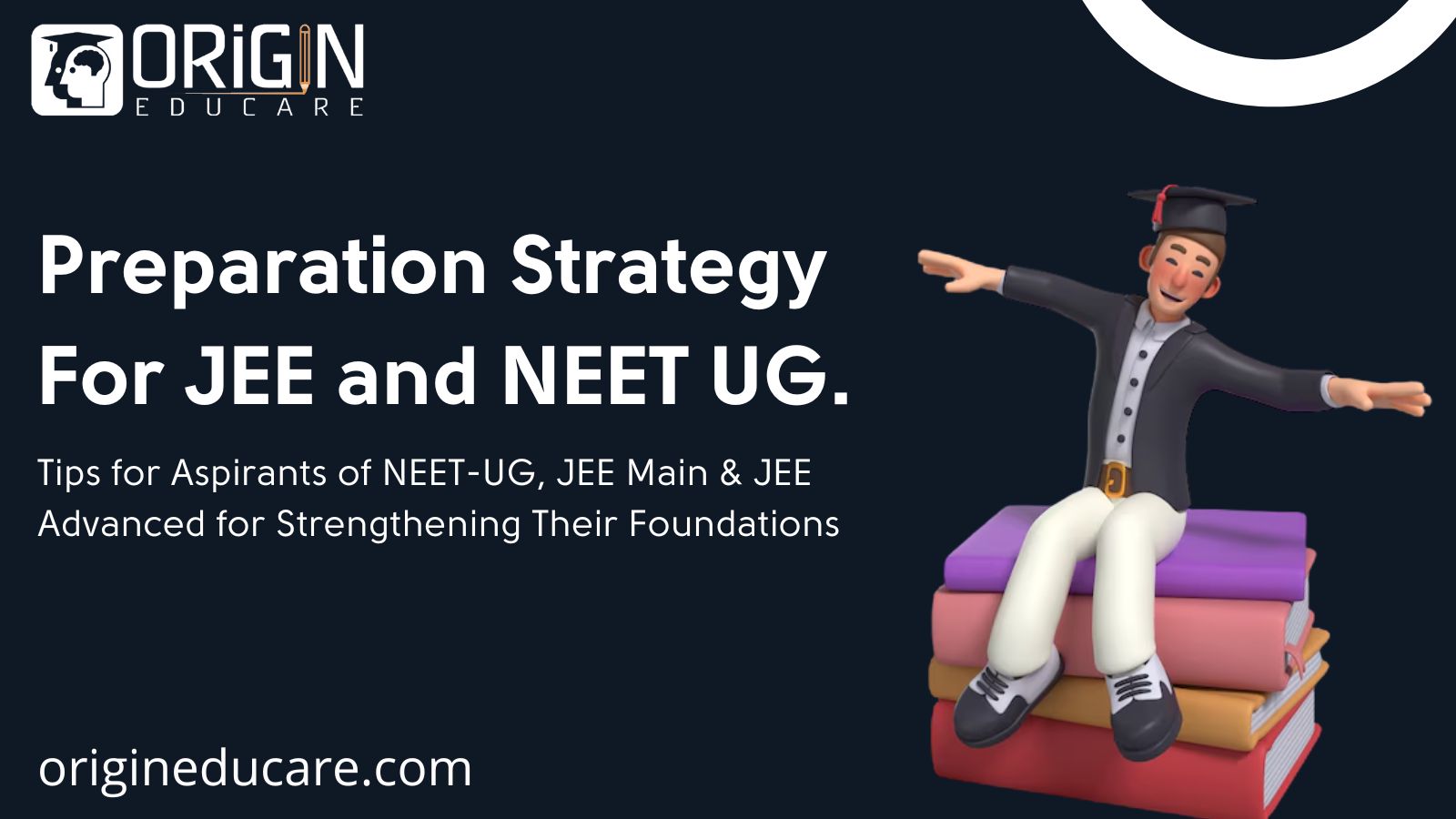Success in NEET-UG, JEE Main, or JEE Advanced begins with a firm foundation. It doesn’t matter if you are aiming for medical or engineering; the path to success equally involves, clarity, consistency and guidance. At the core is a strong plan for preparation, one that incorporates theory, practice and introspection that pushes you stronger each day.
We at Origin Educare, believe in building a strong Conceptual understanding, honing problem-solving ability, and building perseverance. This guide walks through an all encompassing framework to boost aspirants of NEET-UG, JEE Main and / or JEE Advanced from the ground up, gaining confidence, results and ability.
Why Foundation Matters
Every story of a NEET-UG / JEE Topper reveals a universal truth: their strength lies in the concepts. Conceptual understanding of Physics, Chemistry, Biology and/or Mathematics coupled with problem-solving ability (knowing when and how to apply concepts) yields a significant advantage. Here is why:
- Having a depth of understanding allows you to tackle complex problems with flexibility.
- Returning to your knowledge quickly reduces stress during the timed exam.
- A strong foundation in concepts allows you to retain knowledge for much longer, and recall them months after you are first exposed to the content.
- Exam excellence is about application of keystones in principles.
This is why if you make a conscious effort to focus on clarity,!instead of shortcuts, you prepare yourself not just for exams, but for a thought process that lasts a lifetime.
Building a Strong Base: Subject-Wise Strategies
2.1 Physics
Physics is at the heart of both JEE and NEET. To shape that ground:
- You should begin with the NCERT completely especially mechanics, optics, and electricity for theory, definitions and derivations.
- You should solve standard problems (HC Verma, DC Pandey) with respect to naked eye experiences based on base topics.
- You want to visual and quantify: sketch the forces acting on an object, field lines or for circuits, the path of current will facilitate retention of the concept well.
- Allude and Similarity: Try to relate Thermodynamics to real-life experiences; imagine electric flux as flowing water.
2.2 Chemistry
For Chemistry: concerns for clarity and correctness matters across the section of physical, organic and inorganic areas:
- Physical Chemistry: NCERT for theory + repetitive practice numerical problems (S.P. Sethi; P. Bahadur).
- Inorganic Chemistry: NCERT is used for definitions, trendy periodic behaviors, chemical pattern for the reactions; mounted rehearsal
- Organic Chemistry: There should be handhold notes for each reaction describing mechanistic flow while constructing functional groups and their process step. Keep concise notes for all reactions as a fired reference for revision.
- Micro-Concept Practices: A quick round of practice could be conceptually adjusting balance equations, nomenclature for compounds, or comparing chemical properties guarantees gradient retention of these principles.
2.3 Biology (NEET-focused)
Biology is to both memorise and understanding:
- NCERT is your bible; keep on repeating and repeating especially in biology, diagrams, cycles.
- Most of the improvement will come from how much conceptually clarity there is in physiology, genetics and ecology and this will get rid of rote anxiety.
- Draw, Draw & Dynamic Recall: Diagramming diagram and verbally recalling the process will be the best retention quality of the recall.
- Link with life experiences: Compare human bodily system with organs of animal or plants will continue before your eyes which will make loose memory and or subject stick better to your memories-wall.
2.4 Mathematics
Math combines logic, speed, and structured thinking:
- Fundamental theory: Go through derivations in NCERT for formulas; don’t just memorize—understand.
- Understand a variety of questions: for each topic aim for 30-40 questions from a combination of MCQ textbooks like R.D Sharma, Arihant, previous year question papers, etc.
- Be astute and clever with problem sets: being 75% correct at 70% of your current speed is better than being 50% correct at warp speed.
- Find your patterns: quadratics have tricks, calculus can have repeating types of formula. Lock those down.
Structured Study Routine
A solid systematic plan divides your time to accomplish depth, breadth and review:
Daily Blocks
- Morning: New content + overview notes (2 hours)
- Afternoon: Practice session – MCQs and problem sets (2 hours)
- Night: Revision – read through notes, redo difficult problems (1 hour)
Weekly Highlights
- Two full syllabus mock tests
- One long examination analysis session
- One “Tiger session” revisit weakest areas or question concepts that were stuck on.
Monthly Milestone Schedule
- Aim: cover each of the significant chapters at least one time
- One week through the “apex” period: overview / brief look at all subjects
- Revisit all the gaps you noted in your mock test sessions.
This schedule is useful whether you are a Class 11 student or a dropout re-attempting attempts. It’s all about consistency.
Practice Techniques That Work
Active Recall
Close a book, and write down all the information you memorized in 5 minutes. Put the formulas, rules, and definitions into memory.
Space-Interval Revision
Rebuild your anchored topics into your practice at different intervals especially bigger intervals until it appears: 1-day, 3-days, 1-week.
Mock Tests are Mirror
Weekly mock tests evaluate your time management and stamina in the whole 3 hours of assessment.
Error Analysis
What went wrong? If the aim is to learn, recognizing why your mistakes occur is the greatest multiplier of learning.
Concept Revisions
Flash Card, flow charts, or to one page notes of each topic – it helps return to a previous topic quickly.
Handling JEE Main & Advanced vs NEET-UG Focus
Both JEE and NEET-UG require stamina and accuracy but they significantly differ on topics of focus.
JEE (Main + Advanced)
- On scale of a trial, JEE placed more on the assessment instrument in speed, logic, and layered problem solving related especially on physics and mathematics. Using timed subject sessions, juggled speed with accuracy.
NEET-UG
- Whereby students can test for biology in terms of committed memorization, while also allowed for basic mathematics in chemistry.
- Regular committed accuracy drills in NCERT + quick recall of info, aided by prompt memorization techniques, such as mnemonic devices.
At Origin Educare, are timetables are individualised; JEE aspirants focus particularly on the problem blocks of problems, while NEET students resolve daily problem practice conceptually in biology.
Preparing in Tandem with Class or College
If you’re studying in Class 11 or 12, or doing college:
- Devote the morning before classes to serious study.
- Use your breaks smartly—for example, 10 minutes of questions when commuting or during lunch.
- Time of day: evenings for revision or working through problems is best.
- Weekends: longer mocks, playing the length game for revision, working through plenty of questions to clear doubts.
Time is short, and compressed blocks are always better than long, uncompressed blocks without focus.
Enhance Your Journey with Origin Educare
Why Origin Educare works:
- Weekly mentor meetings to check engagement and mindset
- Daily logs and timetables that encourage deviations as necessary
- Concept Camps—twice per month to work through base-level doubts
- Time subject-specific drills + full mocks, weekly with time to get used to panic
- Holistic support—stress relief, nutrition, mental calmness, and energy guides
Our goal: transform overwhelming prep into structured progress you can rely on.
Common Challenges & Solutions
| Challenge | Cause | Fix |
| Feeling overwhelmed, scattered focus | Studying everything at once | Use topic-wise goals and focused study blocks |
| Repeated mistakes in mocks | Conceptual gaps | Mentor help + concept reinforcement sessions |
| Burnout and exhaustion | No structured rest or meals | Schedule breaks, healthy food, and small exercises |
| Low motivation for weak subjects | Unattractive material | Use concept maps, short notes, or peer learning |
| Not enough progress even after effort | Lack of strategic approach | Switch to timed practice + error analysis |
Staying Mentally & Physically Fit
Success is more than just science:
- Sleep 7–8 hours each day gives you better memory and focus
- Physical activity—walks or light work outs get your mind fresh
- Mindfulness practice decreases exam stress
- Organized meal plan—eat brain food fruits, drink water, eat lean proteins
Fellow students will always write about the change they saw (not just academic improvement) within the education space at Origin Educare, when they started to care for their body and not just the book.
Tracking Progress & Celebrating Wins
Use quantifiable metrics:
- Mock scores
- Time/Solve per problem
- Revision retention rates
- Confidence levels in subjects
Weekly reviews with your mentor—you should feel good if you celebrate tiny changes to your progress.
Monthly reviews can help shed light on an area of stagnation in your studies, resulting in schedule changes.
Final Stretch Strategy
Final months before exams:
- Polish all backlog topics using concept flashcards
- Intensive mock test regimen – alternating between JEE and NEET formats
- Daily revision of tricky topics from your errors list
- No panic! Review your milestone achievements—stress indicates growth
Conclusion
At Origin Educare, we prepare our students not just academically. We support change mentally, physically and strategically. We support changing your computerized mindset to build confidence daily rather than anxiety. If you ready to build your foundations and make it down the yellow brick road every day Origin Educare can help you get there!
When you build a foundation, disciple of time, and disciplined procedure the only sound path of success between you and your goals, suggests each day is preparation for success in JEE or NEET, but for whatever life, your future challenges await. Good Luck!
3–4 focused hours daily on core concepts and problem practice, in addition to school/college schedule.
Yes. NCERT offers the base for exam pattern, definitions, and clarity, especially in biology and inorganic chemistry.
After building core concepts, tailor subject time to your goal: more biology for NEET, more math problem solving for JEE—while keeping the other subject fresh.
Review each error: why it happened, what knowledge gap exists, and how you’ll revise that concept. Write correction logs.
Yes. Drop-year students can use their knowledge base, combined with a methodical plan, to recover lost ground quickly under mentorship.


